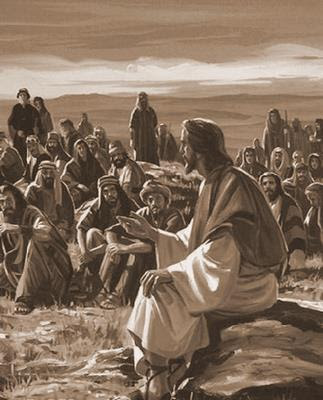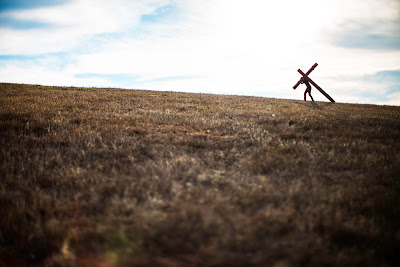Sometime
about a year ago a house on my way to and home from church got painted pink. All
the other houses along that street are plain-colored, ordinary-looking houses. That
whole house, however, from the ground to the roof and every bit of siding and
shudder in between, is a bright pink. It is so pink that even I, someone who
suffers from red-green colorblindness, can tell it stands out. My wife says it
is a Pepto-Bismol shade of pink, just to give you a mental image. We happen to
like it. It’s just…different. Who knows? Maybe the person who lives there is a
John Cougar Mellencamp fan.
The
other day as I was driving that route I got to the next stoplight past that
house and for some reason a question popped into my head: is that house still
pink? And then I couldn’t believe I had even asked myself that question
because, after all, I had just driven past it. It was clearly painted to be
noticed, to turn heads, and yet, after going right past it about nine or ten
times each week, I had somehow managed to stop seeing it altogether. It had
become just a part of the scenery, I suppose, part of my way to work. I hadn’t
necessarily chosen to ignore it, but my mind had moved on to other things. The
really interesting thing is that later that day, on my way home, even after I had
resolved to look at it, I passed the same house again and, once again, failed
to notice if it had been re-painted or if it was still pink.
 |
| Lazarus and the Rich Man (Fedor Bronnikov, 1886) |
The
parable that Jesus tells the Pharisees this morning which has come to be known
as the parable of the rich man and Lazarus, is about noticing things. It’s
about not passing by, over and over again, that which really should stand out, that
which should really disturb and distract. It’s kind of an extreme example, an embellished
tale about two people and the drastic consequences that befall them after they
die, but the message Jesus has for his listeners is there are certain pink houses
smack in front of us and, believe it or not, it’s awfully easy to let our minds
be lulled into ignoring them.
We
begin with a rich man. He dresses in the finest clothes available and he eats
whatever he wants and however much he wants every single day. We would say he’s
in the 1%. In fact, he’s the top 1% of the 1%. Then there’s Lazarus, the bright
pink house situated at the opening to his property. Right of the bat there is
something noteworthy. No other character in any of Jesus’ stories has a name. Not
even the rich man has a name. Lazarus happens to mean, of all things, “God
helps.” He’s the bottom 1%.
Jesus
really piles on the details with Lazarus, and it’s kind of gross. In the time
before napkins, they say wealthy people used to use pieces of bread to wipe
their mouths and then toss it to the floor. That’s what Lazarus wants to eat. He
doesn’t get to, of course, but if he could just get one spit-covered piece of
leftover bread with some half-chewed pieces of food on it he’d be satisfied.
And
then there are the open wounds all over his skin. Every day, right there in
front of the rich man’s house, right where Lazarus’ friends had laid him, the
mangy street dogs come, almost like they expect him to die. The wounds on his
skin are oozing with something they like to lick, and poor Lazarus is too weak
and tired to shoo them away.
And
that’s Lazarus’ day: lying at the rich man’s gate, dreaming about scraps of
slobbery bread while dogs lick his wounds. It’s a really, really a sad sight. Except
the rich man apparently doesn’t see it. And if he does see it, he doesn’t see
it for what it is, or, I should say, he doesn’t see Lazarus for who he is. He
is someone God helps. And therefore Lazarus is an opportunity to practice
compassion.
 |
| Meister des Codex Aureus |
Of
course, the real interesting action takes place after the two men die. Lazarus
is whisked away by the angels to rock in the bosom of Abraham and the rich man
goes down to Hades where he suffers in extreme heat, where it’s, like, 95˚ with
a heat index of 110˚, and he didn’t get to bring his water bottle. Suddenly,
for the first time, he sees Lazarus! He notices Lazarus, even though now he is
far away, because Lazarus has something that he wants. Abraham and the rich man
go back and forth over this request for a water droplet until finally the rich
man thinks of someone else…his brothers, who are probably just as well-off as
he was. Jesus’ parable ends with an intriguing bit of foreshadowing. Those who
are not able to notice through God’s Word through history that God helps the
downtrodden, that God desires mercy for the neighbor, that God looks on the
lowly, are probably not going to understand God’s essential character even
should someone rise from the dead.
Jesus
never intends for this parable to be a literal description of what happens to
people when they die. And neither is Jesus trying to teach that only by doing
good things can someone avoid Hades and get into heaven. Those are exaggerated,
folklore-type features that Jesus has added in. They’re in every parable Jesus
tells, over-the-top elements that surprise and sometimes warn. Here he’s added
them so that the Pharisees and anyone else who is listening may understand that
a great reversal is taking place. With Jesus, the entire system of the world
will be upended, turned upside down, and it is high time to notice the kinds of
people God has decided to help, the kind of situations God has chosen to get
involved in.
It
just so happens that wealth, possessions, material things can blind us to that
great reversal. And it’s not just affluence that has that ability. Educational
level, class, race, even technology can do the same. There was a piece in the Washington
Post this week titled “Why Church Can Rescue Us from our Smartphones” which
made excellent observations about how our constant desire to be connected
through technology has actually, in many cases, “disconnected us from our sense
of humanity and from one another.”[1]
All of these things—money, education, technology—are gifts from God but,
allowed to run amok, can have a power over us, reinforcing our innate
selfishness and encasing us in a type of privilege that prevents us from
understanding what it’s like from someone else’s perspective.
As
for the Pharisees, those in Jesus’ day who are a bit infatuated with wealth, no
one speaks with greater authority than Abraham. And Abraham reminds them that
the whole gist of God’s law and order is to practice compassion, to take care
of the unfortunate. That is, to open our eyes and see the things that God sees
and God helps. God sees the orphans and the widows, as the psalm appointed for
today reminds us. God sees the stranger, the one who doesn’t have a home, the
one who doesn’t belong. God notices those who are oppressed. God never, ever,
drives by and gets to the next stoplight and wonders, “You know, did I just
pass someone who the world seems to have forgotten? That house, where that
family just lost a loved one, is it still there? Or that house, where someone’s
struggling with addiction and the shame it has brought them, is it still there?”
In Jesus Christ of Nazareth, crucified for the world, God is driving around and
stopping at all these Lazarus places—and making them his priority. It would be
a shame for us to miss out on the great reversing, the first-shall-be-last-and-the-last-shall-be
first-thing that is happening for real in his resurrection from the dead.
Speaking
of people like orphans and widows and noticing them, of being in tune to Christ’s
great reversal and jumping in to help, Matt Greenshields, our Council Secretary,
received a special thank you note last month from Lutheran Family Services of
Virginia. The email contained a link to a story about a 12-year-old boy named
Jahem who had spent most of his life in the foster care system (and in
hospitals) but who had recently been adopted by a family and given a forever
home. The note, which Matt shared with me and Council, and we think needs to be
shared with you, read,
“Dear
Matt,
I
wanted to send you a link to this story and share with you how we used some of
the donation money received from Epiphany Lutheran Church. This little
boy has had multiple surgeries over the years for his medical needs and we
finally found an adoptive family for him! Several years ago, Epiphany
also donated money for a special speaking device for this young man, as he is
nonverbal. We used a portion of the donation money to throw him a huge
adoption party and to buy some nice gifts for the family – including a picture
of a family tree with all of their names on it. We are so very thankful for the
support Epiphany has provided us through the years.”
So,
Jesus’ parable reminds us we are on a journey of grace to see the ones God sees,
to help the ones God helps, the ones first in line for the great big turnaround
his creation is longing for. As we open up our eyes, as we receive God’s Word, as
we remember he has risen for us to have new life, we begin to see them, too. And
when we have our eyes opened wide enough by the Lord of heaven and earth, we
look around at the people in the news, the stories from around the world, the
Jahems and Lazaruses and rich men and women who are right around the corner and
we may even begin to realize, my goodness, (Grant us wisdsom! Grant us
courage!) this parable isn’t such an exaggeration after all!
Thanks
be to God!
The Reverend Phillip W.
Martin, Jr.













